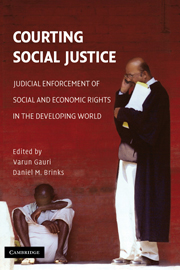Book contents
- Frontmatter
- Contents
- Foreword
- Preface
- Contributors
- 1 Introduction: The Elements of Legalization and the Triangular Shape of Social and Economic Rights
- 2 Litigating for Social Justice in Post-Apartheid South Africa: A Focus on Health and Education
- 3 Accountability for Social and Economic Rights in Brazil
- 4 Courts and Socioeconomic Rights in India
- 5 The Impact of Economic and Social Rights in Nigeria: An Assessment of the Legal Framework for Implementing Education and Health as Human Rights
- 6 The Implementation of the Rights to Health Care and Education in Indonesia
- 7 Transforming Legal Theory in the Light of Practice: The Judicial Application of Social and Economic Rights to Private Orderings
- 8 A New Policy Landscape: Legalizing Social and Economic Rights in the Developing World
- Index
- References
3 - Accountability for Social and Economic Rights in Brazil
Published online by Cambridge University Press: 27 July 2009
- Frontmatter
- Contents
- Foreword
- Preface
- Contributors
- 1 Introduction: The Elements of Legalization and the Triangular Shape of Social and Economic Rights
- 2 Litigating for Social Justice in Post-Apartheid South Africa: A Focus on Health and Education
- 3 Accountability for Social and Economic Rights in Brazil
- 4 Courts and Socioeconomic Rights in India
- 5 The Impact of Economic and Social Rights in Nigeria: An Assessment of the Legal Framework for Implementing Education and Health as Human Rights
- 6 The Implementation of the Rights to Health Care and Education in Indonesia
- 7 Transforming Legal Theory in the Light of Practice: The Judicial Application of Social and Economic Rights to Private Orderings
- 8 A New Policy Landscape: Legalizing Social and Economic Rights in the Developing World
- Index
- References
Summary
The Brazilian AIDS movement has succeeded in extracting the judiciary's transformative potential, giving momentum to widespread structural reforms on the basis of the strategic use of domestic legislation within a wider human rights perspective.
Miriam VenturaIt is not within the competence of the judicial branch […] to act as a legislator of positive law, whereby it would impose its own criteria upon matters which can only be legitimately defined by the legislature…
Justice Celso de MelloThis chapter examines the origins and impact of litigation for health and education rights in Brazil. The first section examines the demand- and supply-side factors that are related to the decision to legalize demands. The second section analyzes the reasons for judicial support, or denial, of these claims. A third section studies the bureaucratic and political response to court-ordered remedies for violations of constitutional rights to health care and education. Finally, a conclusion summarizes the discussion and presents four models of litigation for health and education rights in Brazil.
The overall conclusion from the information presented is that Brazil has experienced exponential growth in the rate of litigation over health rights, with a much more modest increase in education rights litigation. Most of the demands are individual demands, for specific health-care-related goods and services and are concentrated in the more developed states, such as Rio de Janeiro and Rio Grande do Sul. The courts have been very open to these individual claims and much less willing to accept collective claims.
- Type
- Chapter
- Information
- Courting Social JusticeJudicial Enforcement of Social and Economic Rights in the Developing World, pp. 100 - 145Publisher: Cambridge University PressPrint publication year: 2008
References
- 31
- Cited by

